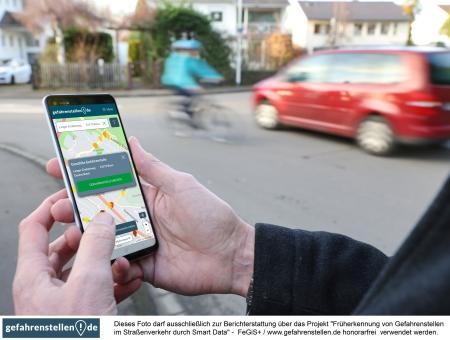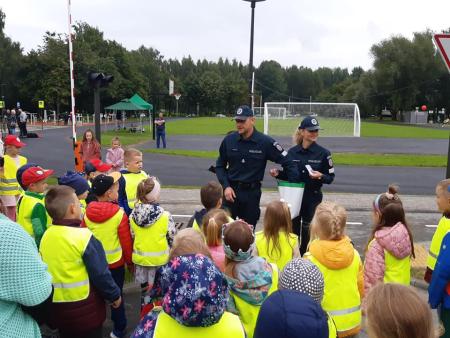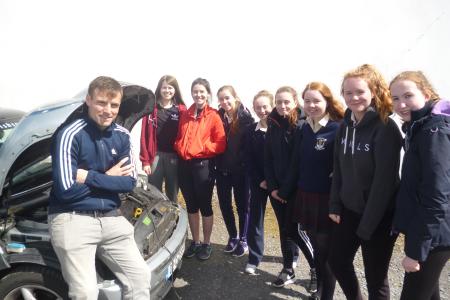Our members are dedicated to improving road safety and sharing their knowledge with the wider community. Here, you can explore our members' good practices – initiatives that have been assessed for their effectiveness in addressing a road safety problem and have proven results.
Get inspired – and sign up to share your good practices too!

Sunday, June 5, 2022
In today’s digital age, more and more data is collected every day in the field of transportation. Still, authorities solely rely on historical traffic accident data to detect black spots. This leads to the shortcoming that accidents must happen before measures are taken. Additionally, in relation to a specific location on the traffic network, traffic accidents are rare events. Thus, for credibly evaluating the safety of a road element, several years of traffic accident data are needed. As a result, road users are put at an unnecessary risk if measurements are taken too late. There is therefore an urgent need to take new paths in the field of road safety analysis. Our EDDA+ road hazard map detects potential dangers in road traffic at an early stage by combining existing safety-relevant data with new data sources.

Sunday, June 5, 2022
In 2008, several fatal accidents involving teenagers on bicycles occurred in our region. Parents' associations of secondary schools sat down around the table to think about a solution together. Studies showed that young people are very often involved in bicycle accidents. The cause is often “not being seen” in the dark. Most primary school children are required to wear a fluorescent jacket in our region. Young people in secondary school don't like wearing fluorescent jackets. They are laughed at by their schoolmates. Imposing an obligation is not possible.
XIU (volunteers organisation) looked for other solutions to tackle this problem in a way that would make it easier for them to do so.
XIU (volunteers organisation) looked for other solutions to tackle this problem in a way that would make it easier for them to do so.

Saturday, June 4, 2022
Vaikai kiekvieną dieną susiduria su eismu keliuose. Deja, eismo nelaimių, kuriose nukenčia vaikai, nepavyksta išvengti. Eismo saugumo įgūdžių ugdymas ikimokykliniame, ankstyvajame mokykliniame ir vyresniame amžiuje neišvengiama būtinybė. Tačiau eismo įgūdžiai nesuformuojami per vieną dieną. Mokyklos tikslas - ugdyti vaikų saugaus elgesio kelyje sampratą ir įgūdžius. Padėti vaikui įgyti jo amžių ir patirtį atitinkančias saugaus elgesio kelyje žinias bei ugdyti nuostatą būti atsakingiems už savo elgesį, veiksmus ir pasekmes kelyje. Mokykloje vykdomi edukaciniai užsiėmimai, renginiai, projektai, dviratininkų stovyklos, neformalaus ugdymo popamokiniai užsiėmimai bei akcijos saugaus eismo tema. Vaikai, šiandieną būdami atsakingi pėstieji ir keleiviai, ateityje taps rūpestingais ir kultūringais vairuotojais. Mokyklos veiklos rezultatas mažėjantis žuvusiųjų ir sužeistų vaikų skaičius Kauno mieste.

Friday, June 3, 2022
Road authorities are increasingly looking for effective road safety measures driven by data in order to succeed in the Vision Zero strategy which has been published by authorities in the national ‘Strategic plan road safety 2030’.
Driving behaviour data provides an important indicator of risk of accidents and road safety. This kind of data is very helpful to analyse how drivers behave and interact with the road infrastructure. For example: where does extreme driver behaviour occur frequently? For example frequent harsh braking on a specific road section can be the consequence of the road infrastructure. Driving behaviour data supports monitoring in an effective way. It enables authorities to check how road safety measures by improving infrastructure are affected driving behaviour.
Driving behaviour data provides an important indicator of risk of accidents and road safety. This kind of data is very helpful to analyse how drivers behave and interact with the road infrastructure. For example: where does extreme driver behaviour occur frequently? For example frequent harsh braking on a specific road section can be the consequence of the road infrastructure. Driving behaviour data supports monitoring in an effective way. It enables authorities to check how road safety measures by improving infrastructure are affected driving behaviour.

Friday, June 3, 2022
Road safety: deaths on Irish roads are increasing year on year , the last three years have shown trends of increasing from 2021- 130 fatalities. 2022- 155 fatalities,to a current high of 88 deaths this year, which is already 10 more death on this time last year, we aim to educate young people on responsibility of driving to the next generation of drivers respecting all road users, ensuring they are fully informed of all topics associated with driving. In our, triangulated program.
This fully supports the Road Safety Authority, who have outlined several priorities in their 2021-2030 phase of vision zero, to reduce the number of deaths by 50% includes key areas,
Seatbelts ,Speeding,Driving while impaired drugs and alcohol tests and penalties , Campaigns, Older pedestrians, E scooters, Time to talk, Anti speeding, Cycling, Vision zero, J1 campaign. Speed Fallacy, Safe vehicles.
We address these targets in our modules.
This fully supports the Road Safety Authority, who have outlined several priorities in their 2021-2030 phase of vision zero, to reduce the number of deaths by 50% includes key areas,
Seatbelts ,Speeding,Driving while impaired drugs and alcohol tests and penalties , Campaigns, Older pedestrians, E scooters, Time to talk, Anti speeding, Cycling, Vision zero, J1 campaign. Speed Fallacy, Safe vehicles.
We address these targets in our modules.